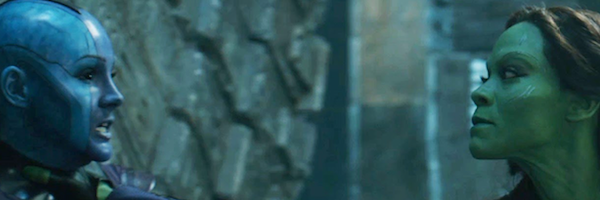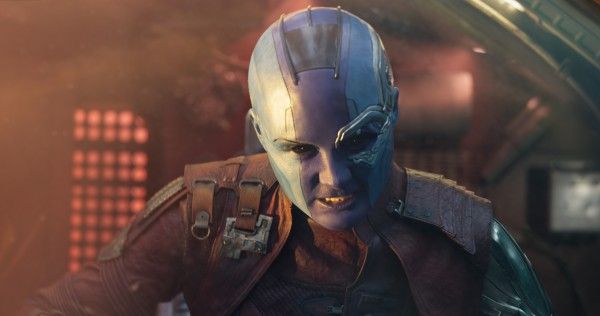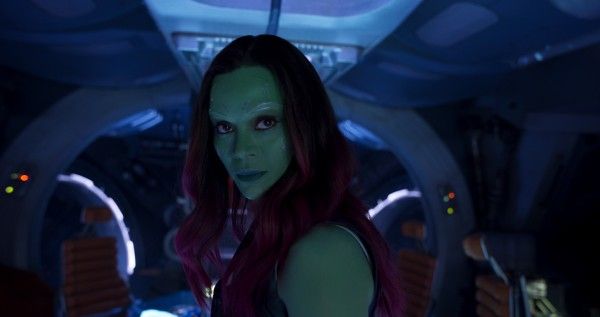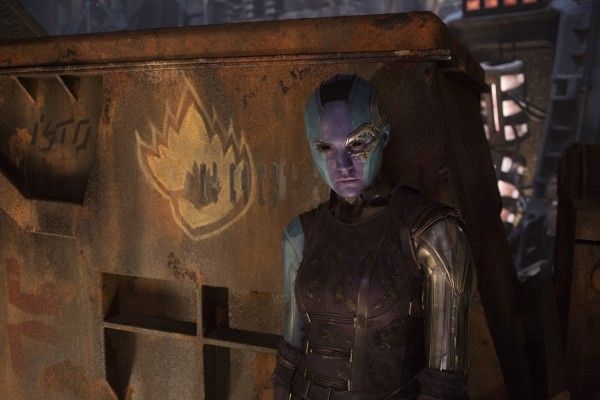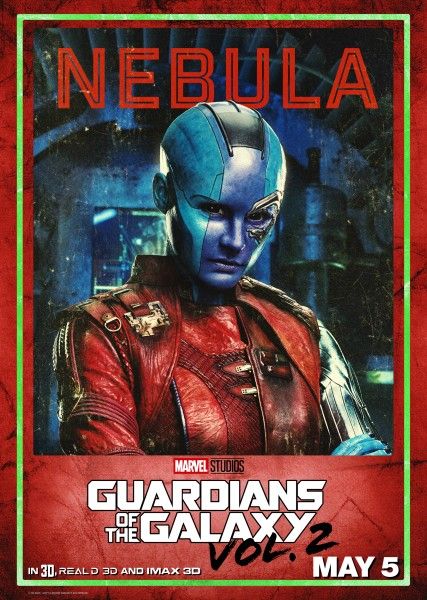[Spoilers for Guardians of the Galaxy Vol. 2 ahead.]
It's no secret that the MCU has become the gold standard for superhero films and interconnected universes, thanks to its ability to balance its massive worlds and ever-swelling casts. But if there's one definitive vulnerability in Marvel's bulletproof reputation (besides super lame villains), it's female characters. Yes, Peggy Carter, Jane Foster and Black Widow have all been treated to their own arcs within the larger MCU, but it wasn't until James Gunn's Guardians of the Galaxy that we finally saw a pair of female characters with their own layered history and compelling emotional stakes begin to steer the proverbial ship. (Sorry, Jane and Darcy.)
Cashing in on some particularly interesting comic book lore, Gunn used the first Guardians of the Galaxy to outline the strained relationship between cosmic sisters Nebula (Karen Gillan) and Gamora (Zoe Saldana), and helped to tease (if not fully explore) their seriously messed up dynamic. At least, it's certainly telling that the closest Nebula gets to expressing affection for Gamora is when she hisses: "You are a disappointment, sister. Out of all our siblings, I hated you the least." But it isn't until Guardians of the Galaxy Vol. 2 that the pair get a chance to fully air their dysfunctional laundry – and put the relationship in its proper spotlight. And in between the fist fights, the two manage to dig into some fascinating backstory (giving us a glimpse of the full potential of Marvel's more inclusive future in the process).
But first, some history: Gamora and Nebula are both adopted sisters of Marvel's looming villain Thanos, who, as his reputation might suggest, isn’t known for his more sentimental impulses. As Nebula reveals, Thanos chose to adopt the two girls based on their violent potential and raised them as sparring partners, forcing them into unending fights to the near-death in an attempt to sharpen their impulses in combat. Gamora would put her all into each fight, managing to best Nebula every single time. And with each loss, Thanos would replace a different part of Nebula's body with mechanical elements in the name of making her stronger. It's certainly a dark revelation that helps breed sympathy for the prickly Nebula, but it also helps to further illustrate the sisters' uneasy bond.
And that bond isn't just supplementary to the plot; Gamora's complicated feelings about Nebula ultimately become the catalyst for the entire film, drawing the Guardians to the Sovereigns in exchange for her freedom. Of course, that “freedom” is only conditional – Gamora has the full intention to exchange the favor in order to officially imprison Nebula for her crimes. But perhaps the smartest initial decision Gunn makes is to almost immediately split the sisters apart, allowing them to carve out their own individual storylines: giving Nebula the choice to be honorable – before of course, she decides not to – and allowing them not just to exist as contingencies of one another but as two separate warring factions.
There is, of course, the issue of whether or not Nebula and Gamora’s arc is simply centralized around their father. Nebula is still torn up over the abuse she faced at the hands of Thanos – and for good reason – but takes her anger out against the far more earth-bound Gamora. “You were the one that needed to win,” she growls at her sibling during their climactic fight, “I just needed a sister.” While Guardians' alternative title could be Daddy Issues: The Movie, the sequel isn't so much about abandoning your biological family as it is choosing your own. And while Gamora and Nebula clearly still have a lot to work through, amidst the hand-to-hand combat the sisters reach the kind of detached affection that Peter and Yondu established years prior.
Here's what Gunn had to say about his decision to devote a significant amount of screen time to Nebula and Gamora (and their shared parental trauma):
There’s something relieving about it, to have everyone’s voice represented in the movie. It’s not about their relationship to their father, ultimately, it’s about their relationship to each other. We have a giant action battle between them, but that’s what it’s about, and the battle is more fun because it comes from character, it comes from who they are.
Perhaps "relieving" is a strange way to describe a contentious and violent showdown, but it also rings strangely true – certainly it's a fantastic step forward for the MCU in its latter stages to finally begin embracing storylines specific to its unique female characters, but it's also proof that this kind of storytelling works and is worth the narrative time that it requires.
Mostly, it's satisfying to watch Gunn finally dig into the sisters' storyline because Gamora and Nebula have the most interesting sibling rivalry this side of Thor and Loki, a pair with family issues so major they've spawned three Thor films. And while Gamora and Nebula's total screen-time still likely totals less than an episode of Agents of S.H.I.E.L.D., the payoff in Gunn's sequel alone signals promise for Infinity War and its follow-ups, both of which get sly groundwork laid through Nebula herself.
Softened but unswayed by on her bloodthirsty campaign to remove Thanos from the galaxy at the close of the film, Nebula exits towards a future unknown. But while she and the Guardians have no idea where that crusade will take her, it's pretty clear to viewers that she's headed right into the events of Infinity War, an arc that could possibly take Nebula directly into the path of Thanos and his precious Infinity Stones, becoming herself a major character and a major catalyst for the events of Phase 3 and beyond. (Even if she goes the way of Yondu before it's all over.)
It bodes well for the future of the studio, whose first two phases were defined almost entirely by the actions and egos of white men, to see the fate of the franchise held (at least partly) in the blue and green hands of two of its most complex female characters. With Captain Marvel in the works and Cate Blanchett's villainous Hela ready to kick ass and take names in Thor: Ragnarok, the surprise at witnessing a believably wrought female relationship in the MCU will hopefully wane, but for now, I'll happily have what Gunn is serving, especially when it results in a movie that's this damn good.

